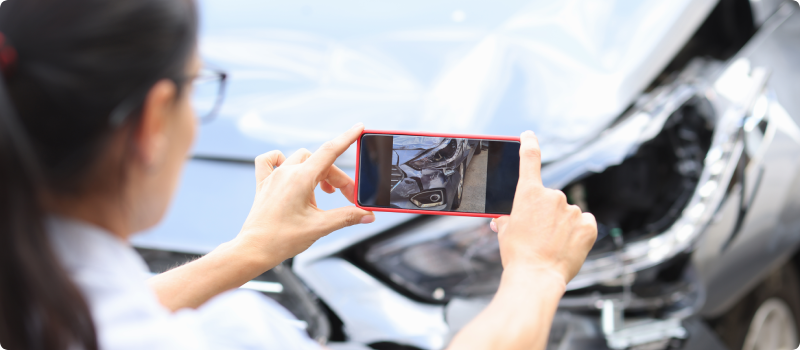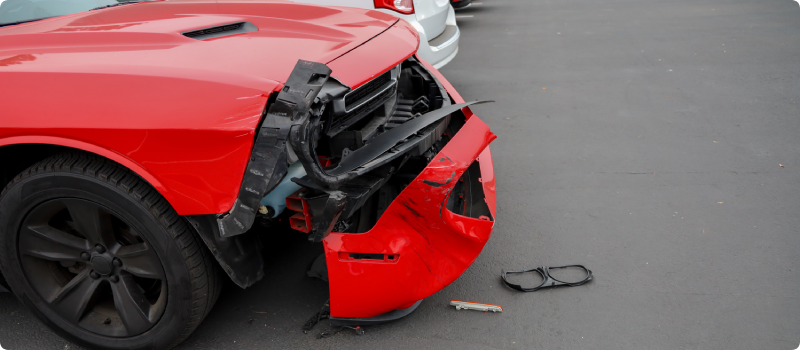Someone Hit My Parked Car: What to Do Next
Updated July 4, 2024 . AmFam Team
A vehicle collision is a vehicle collision, even if it doesn’t happen on the road. Incidents involving parked cars aren’t that much different from other kinds of Incidents. If you ever find yourself saying, “Someone hit my parked car,” you can handle this. Contact the authorities, inform your insurer and follow the next steps outlined in this article.
If They Stayed or Left a Note
Whether the responsible party left a note or waited for your return, here’s how to handle the situation.
Gather and Exchange Info
Ideally, any note left on your car would contain contact and insurance information. Keep it handy and reach out to the other party immediately. If they stayed, you can directly exchange information that your respective insurers may ask for. Examples include phone numbers, vehicle registration and drivers license numbers.
Take Pictures of the Damage
Photographic evidence can help the responsible party’s insurance company and yours. Examine your car from all angles, then get pictures of the damage. If the other person is around, you may want to photograph their vehicle as well. On that note, a nearby storefront or home may have cameras that captured the incident. Contact the camera’s owner for the footage.
File a Police Report
Even if the accident only left your car with small scratches, contact the authorities. Provide as much information with as much accuracy as you can. If any forms are required, learn their deadlines and file them beforehand.
Notify Your Insurer
In situations like these, your insurer may offer comfort and solutions. Contact your agent with all the details about the accident, including what happened, where and when. If you have the other driver’s contact and insurance information, share it. Your agent will see how they can help.

If It Was a Hit-and-Run
If the other party doesn’t leave a proper note, their abandoning the scene may be considered a hit-and-run. Taking pictures of the damage to your vehicle is still as important as ever. So is contacting the authorities and your insurer.
Surveillance cameras could help you find out who was responsible for your parking accident. If you parked in a lot or building, find the security office and request the footage. For street parking, ask local businesses if they have cameras facing the street. Give them the date and the range of hours (ex. Between 6 PM and 8 PM) of the incident.
If You Hit Someone’s Parked Car
You might find yourself on the other end of this situation one day. We understand, it happens. Here’s some advice on what to do if you hit a parked car.
Look for the Owner
Leaving the scene of an incident may put you at risk of hit-and-run charges. Give the vehicle description to anyone around and ask if they’re the owner. Wait, if possible, for the driver to return.
If the Person Returns, Exchange Contact and Insurance Information
Exchanging information is easier when you’re face-to-face with the driver. Discuss each other’s insurance options right away. Then, get each other’s contact information so you can continue the discussion. Some details both parties may need to know include:
- Date of birth
- Driver’s license number
- Home address
- Injuries
- Insurance policy number and expiration date
- License plate number and state
- Names
- Owner’s name and address, if different from driver
- Property damage
If the Person Doesn’t Return, Leave a Note
Realistically, the other driver may not return for hours. If necessary, leave a note with your name, contact information and insurance information. The list in the section right before this one can guide you. Try to find space for an explanation of what happened.
Notify Your Insurer
Inform your insurance agent about the situation as soon as possible. Let them know before the other driver can make a claim. They’ll prefer to hear about it from you first. Tell them about the exact damage to the vehicle, the date and time of the incident and if the other party provided any information about themself.

If someone hits my parked car, will insurance cover it?
Auto insurance may be able to cover damage from a parked car collision. The car that was moving will almost always be considered at fault in these situations. In that case, the liability coverage of the other driver’s auto insurance may cover your repairs.
If relying on your auto insurance claim for coverage, you may be required to pay your deductible. Feel free to ask your agent for the details.
Get Protection with American Family Insurance
“Someone hit my parked car” is not something that anyone wants to find themself saying. But it can happen, so it helps to be prepared for anything with excellent car insurance.
An auto policy with American Family Insurance can help provide peace of mind after a collision. We also offer more potentially valuable resources and information on what to do after a car accident. You don’t have to handle situations like this alone.
This article is for informational purposes only and based on information that is widely available. This information does not, and is not intended to, constitute legal or financial advice. You should contact a professional for advice specific to your situation.
Tools & Resources
NextScripts
JSS component is missing React implementation. See the developer console for more information.

